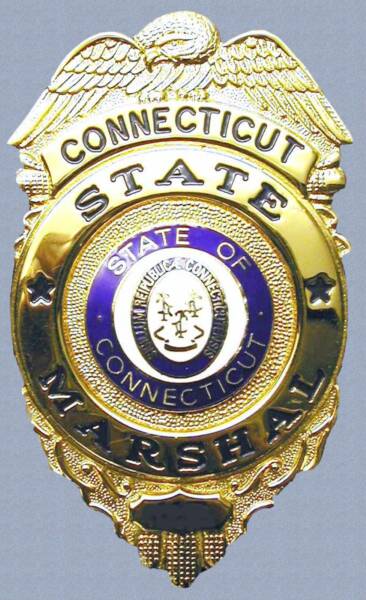* Question: What is a State Marshal?
· The current-day Connecticut State Marshal evolved from, and is the successor to, the Deputy Sheriff of a bygone era. The modern State Marshal is a statutory peace officer of the State of Connecticut, sworn to uphold the constitution and laws of the state. He/She derives his/her authority and power from State law and is the principal resource to the judicial system of the State in serving and executing civil legal process.
The current-day Connecticut State Marshal evolved from, and is the successor to, the Deputy Sheriff of a bygone era. The modern State Marshal is a statutory peace officer of the State of Connecticut, sworn to uphold the constitution and laws of the state. He/She derives his/her authority and power from State law and is the principal resource to the judicial system of the State in serving and executing civil legal process.
* Question: What does a State Marshal do?
· Among the State Marshal’s functions and powers are the service of civil legal process, the seizure of assets, eviction/ejectment, and capias arrest. Such powers, and the usual minimum fees attendant to the services provided, are specified by various state statutes. The Marshal may act only upon a directive/order duly signed by a proper authority, e.g., a Commissioner of the Court; a Court Clerk; a Judge. The Marshal is prohibited from engaging in the performance of duties of his/her own initiative, or in the giving of legal advice.
Among the State Marshal’s functions and powers are the service of civil legal process, the seizure of assets, eviction/ejectment, and capias arrest. Such powers, and the usual minimum fees attendant to the services provided, are specified by various state statutes. The Marshal may act only upon a directive/order duly signed by a proper authority, e.g., a Commissioner of the Court; a Court Clerk; a Judge. The Marshal is prohibited from engaging in the performance of duties of his/her own initiative, or in the giving of legal advice.
* Question: Who does the State Marshal work for?
· By State statute, the Connecticut State Marshal is an independent contractor. He is not an employee of the State. He/she is granted power and authority by State law to act on behalf of the judicial system of the State and its many requirements. Among the many ‘clients’ who would engage a State Marshal to exercise those powers and authority are: agencies of the judicial system (e.g., Superior Court, Juvenile Court, Support Enforcement, Office of Victim Advocate, etc.); other agencies/quasi agencies of the State of Connecticut (e.g. Attorney General’s Office, Office of Consumer Protection, Statewide Grievance Committee); municipalities, lawyers, and members of the general public (generally referred to as a ‘pro se’ party) intending to represent themselves before the Court.
By State statute, the Connecticut State Marshal is an independent contractor. He is not an employee of the State. He/she is granted power and authority by State law to act on behalf of the judicial system of the State and its many requirements. Among the many ‘clients’ who would engage a State Marshal to exercise those powers and authority are: agencies of the judicial system (e.g., Superior Court, Juvenile Court, Support Enforcement, Office of Victim Advocate, etc.); other agencies/quasi agencies of the State of Connecticut (e.g. Attorney General’s Office, Office of Consumer Protection, Statewide Grievance Committee); municipalities, lawyers, and members of the general public (generally referred to as a ‘pro se’ party) intending to represent themselves before the Court.
* Question: How do I know someone is really a Connecticut State Marshal?
· Unlike other law enforcement officers throughout the State, the State Marshal does not wear a uniform. Like other law enforcement officers in the State, a State Marshal is exempt from statutory laws of trespass when engaged in the performance of duties. He/she is obligated to carry identification when in the performance of duties. Such identification includes a numbered badge and a photo-bearing ID card. If there is any doubt that the person identifying himself/herself is in fact a Connecticut State Marshal, both badge and ID should be requested by the person approached by the State Marshal.
Unlike other law enforcement officers throughout the State, the State Marshal does not wear a uniform. Like other law enforcement officers in the State, a State Marshal is exempt from statutory laws of trespass when engaged in the performance of duties. He/she is obligated to carry identification when in the performance of duties. Such identification includes a numbered badge and a photo-bearing ID card. If there is any doubt that the person identifying himself/herself is in fact a Connecticut State Marshal, both badge and ID should be requested by the person approached by the State Marshal.
* Question: How much does a State Marshal charge for his services?
· Minimum fees for standard service by a State Marshal are prescribed by law (CGS 52-261). However, state statute CGS 6-38a reads in part: “…a [state marshal]… shall have authority to provide legal execution and service of process in the counties in this state pursuant to section 6-38 as an independent contractor compensated on a fee for service basis, determined, subject to any minimum rate promulgated by the state, by agreement with an attorney, court or public agency requiring execution or service of process”.
Minimum fees for standard service by a State Marshal are prescribed by law (CGS 52-261). However, state statute CGS 6-38a reads in part: “…a [state marshal]… shall have authority to provide legal execution and service of process in the counties in this state pursuant to section 6-38 as an independent contractor compensated on a fee for service basis, determined, subject to any minimum rate promulgated by the state, by agreement with an attorney, court or public agency requiring execution or service of process”.
When a Marshal is asked or directed to make service in a certain way (e.g. make personal [in-hand] service instead of legally acceptable residence [abode] service), or is requested to make immediate/expedited service (i.e., disrupting the flow and timing of all other scheduled services in the Marshal’s possession), or to handle a service in some unusual way (e.g., engage in surveillance for as long as necessary to achieve service to a named defendant), such services are considered ‘extra-statutory’, or beyond the ‘standard’ intended by law, and additional fees will usually apply to compensate the Marshal for added time, travel/mileage, disruption to schedule and, of course, any out-of-pocket expenses that may be associated with the service. The above referenced statute 6-38a provides the basis for such additional fees for service. It is best to go over the manner of service with the State Marshal at such time as he is engaged to make it, and thus avoid any post-service issues related to his/her time or costs. Every State Marshal should be prepared to give you an approximate quote for the cost of service, provided the intended service is accurately described.





